In five days time begins one of the most celebrated festivals of Judaism; that is, Passover, the Feast of Unleavened Bread. Easter has come and gone, and perhaps you had the joy of attending a Passover presentation at church, but according to Scripture, the dates of Jesus’ death, burial and resurrection coincide with the days of Passover, which on the Jewish calendar falls next weekend. Passover is one of my favorite holidays because the biblical Jewish traditions surrounding it provide so much rich symbolism through which we can learn a great deal about the character of God, how He has chosen to relate to mankind and His incredible plan to redeem us by sending a Savior or Messiah to make the necessary payment for our sin.
As I clean my home of chametz, or leaven, and prepare for Passover to begin, I embrace the tangible reminder to meditate on all that God has done for me and examine my life and heart for areas of sin that also need to be cleansed, as God continues to sanctify me and make my life a clearer reflection of Himself.
Whether you are Jewish or not, I invite you to join me in physically and spiritually removing leaven from your life this Passover. To help us intentionally meditate on the spiritual truths symbolized in Passover, I’ve asked eight respected friends to write a devotional for each day of unleavened bread. Reading them has already blessed my socks off and I’m confident you will enjoy them too! This first wonderful devotional by our coworker, Stephen Arnold, explains the significance of cleansing the home of leaven.
__________________________________________________________________________
“Seven days you shall eat unleavened bread. On the first day you shall remove leaven out of your houses, for if anyone eats what is leavened, from the first day until the seventh day, that person shall be cut off from Israel.” Exodus 12:15 (ESV)
“Your boasting is not good. Do you not know that a little leaven leavens the whole lump? Cleanse out the old leaven that you may be a new lump, as you really are unleavened. For Christ, our Passover lamb, has been sacrificed. Let us therefore celebrate the festival, not with the old leaven, the leaven of malice and evil, but with the unleavened bread of sincerity and truth.” I Corinthians 5:6-8 (ESV)
The story of Passover is the story of the exodus of the Jewish people out of Egypt. When the Jewish people left Egypt, it says that they left in such haste that their dough didn’t have time to be leavened (Ex. 12:39). Once this unleavened dough was cooked, the result was matzah, which is essentially a large cracker.
While this is the origin of eating matzah on Passover, there is a much deeper significance to why God commanded that no leaven be eaten during Passover. This is because leaven represents sin. The seriousness of this representation is displayed in the punishment for eating leaven during Passover: expulsion from Israel (Ex. 12:15). The person who eats leaven during Passover is essentially saying that he is disregarding the covenant that God has made with His people, and this rebellion has repercussions.
This is why Orthodox Jews go to great lengths to cleanse their homes of leaven. Every corner of their home is cleaned from top to bottom. Even special dishes are used, which are only used during Passover and have never touched leaven. Nothing is left unclean or uninspected. Every book they own is shaken out to ensure that if someone was eating a cookie while reading, no single crumb containing leaven could be found contaminating their home.
This is the point: sin is what separates us from God (Is. 59:2, Rom. 6:23). If sin once completely separated us from God and we have been forgiven through the blood of the Lamb, how can we allow it to continue in our lives once we are cleansed? The act of cleaning out one’s home of symbolic sin should be a huge reminder to clean all sin out of our lives. It may seem strange that some Jewish people go to such extremes to cleanse their homes of leaven, but have we gone to such extremes to cleanse the most spiritually toxic thing from our lives? Have we even taken the time to examine the hidden corners of our lives so we can clean out the filth and be brought closer to our Savior? As Passover is a time of remembering Messiah’s death, burial, and resurrection, may this season be a time of introspection and removal of sin so we can partake of the body and blood of our Messiah in a worthy manner (I Cor. 11:27-32).
Stephen Arnold is a Jewish believer in Jesus and a full time missionary with Chosen People Ministries. He currently serves in Argentina, loving, serving and evangelizing to Israeli backpackers. In the future, we will partner with him to open a new outreach to Israelis in Brazil!



